If you’re a history buff looking to further your education in the field, you may consider looking into masters in history programs.
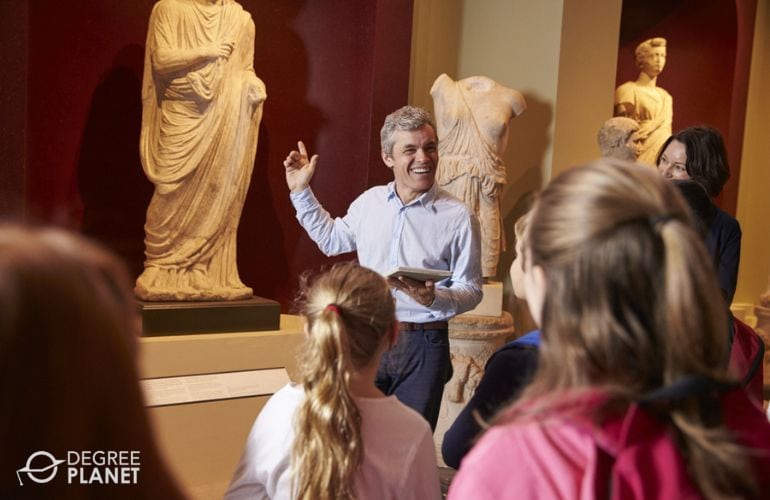
Students who pursue these degrees typically already have a bachelor’s degree in a related field. Master in history programs may help graduates pursue roles as historians, teachers, museum workers, journalists, and more.
Editorial Listing ShortCode:
While enrolled in a history masters program, you’ll typically have the option to specialize in a certain area of study that you’re most interested in.
Online Masters in History Programs

History masters programs teach students how to gather and interpret historical information and how to effectively write and present their findings.
In addition to having you take a wide variety of history courses, these programs may help you develop valuable research, writing, and presentation skills. During your masters in history program, you’ll likely study some of the following topics:
- World History
- Research methods
- Ethical responsibilities of a historian
- Writing for different audiences
- European history
- Judaic studies
- African History
- Colonialism
- Slavery
Graduate history degrees typically allow students to select a concentration that they’re most interested in. These concentrations can range from American or European history to military history or museum studies.
Editorial Listing ShortCode:
Students in these programs usually take foundational yet advanced history classes. They may also be able to take classes more specific to their concentration, which can include seminars, internships, and research. Many graduates choose to work toward careers as historians, secondary or postsecondary teachers, archivists, museum curators, and more.
Some students use this masters degree as a stepping stone to pursue a doctorate in history or a related field. Graduates may also pursue careers in writing, such as editors or journalists. In these types of roles, they may use their historical background to document current events.
Common Online Master’s Degree in History Concentrations

History masters programs typically allow students to pick a specific concentration so they can study material that allows them to become an expert on a certain topic.
A few examples of concentrations you may be able to choose from are listed below:
- History of Science. This concentration focuses on how science has evolved over hundreds of years.
- European History. You’ll specialize in researching different European countries’ histories, and you’ll examine this continent’s influence today.
- Museum Studies. You’ll learn all about how to run a historical museum, including fundraising, historic preservation, and more.
- World History. This concentration teaches you about the historical relationship between various countries and cultures.
- Military History. You’ll specialize in the global history of the military and its effects on different regions.
The coursework and focus of your history masters program may vary depending on which concentration you choose. For instance, a history of science concentration may involve taking science classes in addition to history courses.
History Careers and Salaries
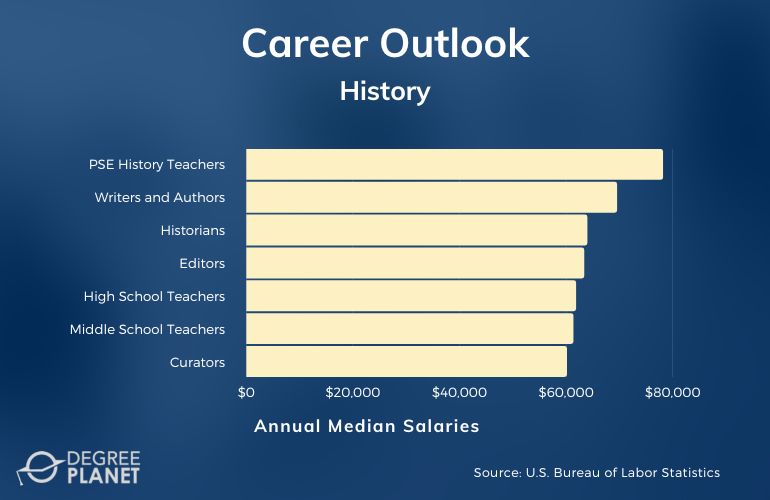
Graduate programs in history can prepare students for a variety of careers. Common industries for history professionals include teaching, writing, research, and museum work.
One popular career path for graduates is to pursue a role as a historian. These professionals typically spend their days gathering, analyzing, and preserving historical information as well as presenting their findings to others.
According to the Bureau of Labor Statistics, here are the salaries of potential positions associated with history.
| Careers | Annual Median Salaries |
| Postsecondary History Teachers | $78,130 |
| Writers and Authors | $69,510 |
| Historians | $63,940 |
| Editors | $63,350 |
| High School Teachers | $61,820 |
| Middle School Teachers | $61,320 |
| Curators | $60,110 |
| Archivists | $60,050 |
| News Analysts, Reporters, and Journalists | $48,370 |
| Museum Technicians and Conservators | $47,630 |
Graduates may also choose to pursue roles as history teachers for middle school or high school. Additional teaching licenses may be required, especially for positions in public schools. Masters graduates may also qualify for teaching positions in community colleges or entry-level positions in universities. Most postsecondary teaching positions, though, require a doctoral degree.
Editorial Listing ShortCode:
Professionals with masters degrees in history may also decide to work toward jobs as journalists and editors, where they can focus on history in their writing.
History Master’s Curriculum & Courses

Online MA in History programs can have different course offerings, but below are a few examples of classes you may encounter as part of your curriculum:
- Historical Methods: This class covers various perspectives on how to study history while maintaining professionalism throughout.
- Historiography: You’ll learn different methods of historical writing, including historical arguments, narratives, and analyses.
- History of Islamic Societies: This course focuses on Middle Eastern history and looks at Muslim countries’ militaries, culture, trade, and more.
- Comparative History and Research: You’ll learn how to properly conduct historical research, including explaining your research subject correctly and developing a constructive argument.
- Seminar in American History: This class covers standout events in American history, such as World War II and the Great Depression.
- Cold War and the American Empire: You’ll learn to make connections between the Cold War and other significant historical events of that time.
- Chinese Imperialism: This course looks at various strategies of the Chinese military and how they have been deployed in the past.
- Archival Management: You’ll learn how to accurately preserve and manage archive records as well as how to determine their usability.
- Early American Encounters: This class teaches about the earlier years of the United States and the role colonization played in the formation of the country.
- Seminar in Global History: You’ll learn how to research and write about historical and modern-day events that took place all over the world.
Depending on which classes you take and which concentration you choose, your masters program may include research, seminars, internships, and more.
How to Choose an Online Master of History Program

Before choosing to devote your time and money to a graduate history program, it’s strategic to make sure the program meets all your expectations for a masters degree.
When deciding which degree program to enroll in, you may want to take the following factors into consideration:
- Location
- Cost
- Accreditation
- Reputation
- Teaching methods
- On-site requirement
- Student support services
When looking at online degree options in particular, you may want to check if they have any on-site requirements, such as asking students to travel to campus for school events. You may also want to see what kind of technical support they offer if their website or system goes down.
Teaching methods and school reputation may also be helpful to research ahead of time, as you can get an idea of the quality of the school’s professors as well as their teaching styles.
History Master Programs Admissions Requirements

The admissions requirements for history masters programs can vary, but here are a few common ones:
- Bachelor’s degree and transcripts
- GRE scores (only required by some schools)
- Writing sample
- Minimum undergraduate GPA
- Letters of recommendation
Students applying to graduate programs in history have typically already completed a bachelor’s degree. You’re usually required to submit all of your undergraduate transcripts. In addition, since history is a writing-intensive subject, many graduate programs ask for a research paper or another type of writing sample.
Online Masters Programs in History Accreditation
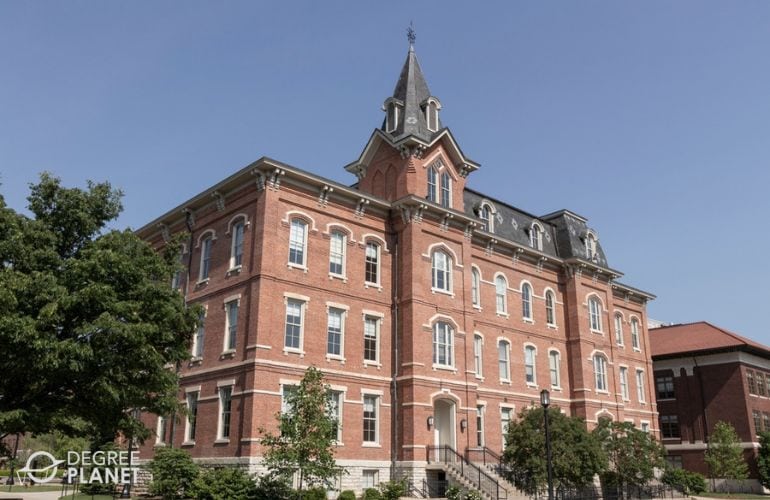
Before applying to a masters program, you may want to investigate whether the school you’re interested in is regionally accredited. This status means an accrediting organization has found that the school meets a set of academic quality standards.
Editorial Listing ShortCode:
Enrolling in a regionally accredited school can be a strategic move, as it may help you stand out when looking for jobs after graduation. It’s also necessary to attend an accredited school if you’re interested in applying for federal financial aid.
To learn more about accreditation, you can visit the US Department of Education’s website.
Financial Aid and Scholarships

The Federal Student Aid website offers a variety of financial aid options that you may be able to apply for. For qualifying students, financial aid can help assist with the upfront costs of completing master in history programs.
Graduate students may be able to apply for direct unsubsidized loans, in which the student pays the interest but there is no need to show financial need. Direct PLUS loans are another option, and eligible students can apply through the FAFSA on the Federal Student Aid website.
You can also look into different options for grants, scholarships, and work-study programs. Schools may have their own scholarship funds, and some even offer scholarships specific to certain majors.
What Can You Do with a Masters in History?

According to the Bureau of Labor Statistics, some of the careers associated with history are expected to have faster-than-average growth over the next ten years. For example, curators, archivists, and museum technicians are in high demand.
So, what can you do with a history degree? Library and museum work are popular tracks for history professionals. Others pursue writing or journalism roles. Many graduates also pursue roles as historians after completing their masters degree. Some choose to work toward jobs as history teachers at the middle school, high school, or community college level. Those who hope to become university professors often go on to earn a doctorate or PhD in the field.
How Much Money Can You Make with a History Masters Degree?
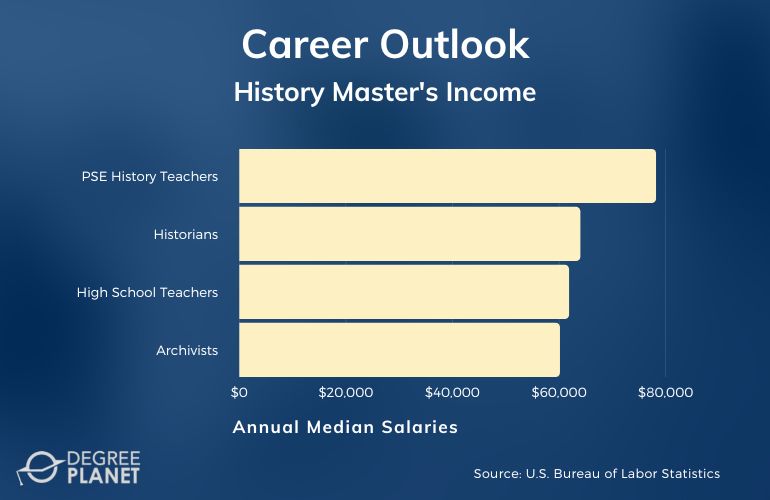
The amount of money you can make with a masters degree in history depends on a variety of factors, including your level of education, work experience, skillset, location, employer, and more.
According to the Bureau of Labor Statistics, the median salaries of curators and archivists are $60,110 and $60,050, respectively. While the median salary for historians is $63,940, the top earners make more than $118,380.
Many graduates also pursue jobs in teaching. High school teachers have a median salary of $61,820 per year, while the median for postsecondary history teachers is $78,130.
How Long Does It Take to Get a Masters Degree in History Online?

The timeframe for completing history masters programs varies based on a few different factors, such as enrollment status and thesis requirements.
If you don’t need to complete a thesis and you’re enrolled in a 36-credit hour program, you may be able to finish your degree in as little as 1 year. This timeframe includes full-time enrollment with summer courses. If your program does have a thesis requirement, or if you take classes part-time, your degree may take longer to complete.
Most masters programs can be finished in 1 to 2 years with full-time enrollment.
Is a Masters in History Worth It?

Yes, a masters in history is worth it for many students. The Bureau of Labor Statistics projects that several history-related careers will have steady growth over the next ten years.
Archivists, curators, and museum technicians are expected to see 12% job growth, which is much faster than average. These degrees may also help you stand out when applying for jobs in teaching, writing, museum work, and more.
Editorial Listing ShortCode:
In addition, a masters degree in history can act as a stepping stone toward a doctoral degree in the field. Earning a PhD is especially beneficial if you wish to become an advanced researcher or a history professor one day.
Universities Offering Online Masters in History Degree Programs
Methodology: The following school list is in alphabetical order. To be included, a college or university must be regionally accredited and offer degree programs online or in a hybrid format.

American Public University offers a 100% online program for a Master of Arts in History. Concentrations are available in American, Ancient and Classical, European, and Global History. Potential classes include Historical Research Methods, Late Antiquity and Byzantium, and History of the Middle East. The program requires the completion of 36 credits and culminates with a final capstone project.
APUS is accredited by the Higher Learning Commission.

Arizona State University offers a Master of Arts in History with two specializations: North American and Global. Graduates often pursue careers as archivists, editors, publishers, consultants, educators, or researchers. The curriculum consists of 10 courses for a total of 30 credit hours. All classes meet online, and each one is 7.5 weeks long.
Arizona State University is accredited by the Higher Learning Commission of the North Central Association of Colleges and Schools.

Eastern Illinois University offers a fully online program for a Master of Arts in History. The curriculum offers concentrations in US, Premodern, and Modern World History.
The program’s thesis track requires the completion of 30 credits, while the non-thesis options require the completion of 32 credits. On average, the degree can be completed in 2 years. Full-time students can potentially complete it in just 3 semesters.
Eastern Illinois University is accredited by the Higher Learning Commission.
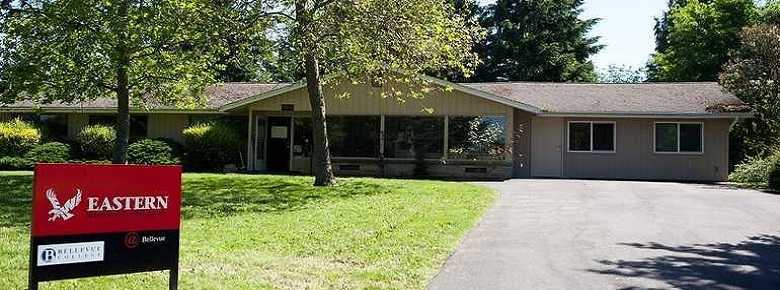
Eastern Washington University offers a Master of Arts in History. This program is intended for students who have previously completed a bachelor’s degree in history or a related field. This program can be completed online or on campus. The program’s 45 required credits can potentially be completed in 8 months of full-time attendance.
Eastern Washington University is accredited by the Northwest Commission on Colleges and Universities.

Florida International University offers a Master of Arts in History. The curriculum covers human civilization throughout Africa, Asia, Europe, Latin American, and the United States. The program requires the completion of 30 credits. Requirements must be completed in person if the thesis or public history tracks are chosen. The requirements of the report track may be completed online.
Florida International University is accredited by the Southern Association of Colleges and Schools Commission on Colleges.

Indiana University offers a 100% online program for a Master of Arts in History. The program aims to help students develop competencies in written and oral communication, research, rhetorical arguments, and digital history. It requires the completion of 30 credit hours. Graduates often pursue careers as researchers, writers, journalists, secondary teachers, librarians, or museum archivists.
Indiana University is accredited by the Higher Learning Commission.

Liberty University offers a Master of Arts in History. This program may be an excellent fit for students who want to pursue doctoral studies or work as archivists, archaeologists, educators, or political scientists. Classes meet online, and each one is 8 weeks long. The program’s 36 required credits can potentially be completed in just 1.5 years.
Liberty University is accredited by the Southern Association of Colleges and Schools Commission on Colleges.
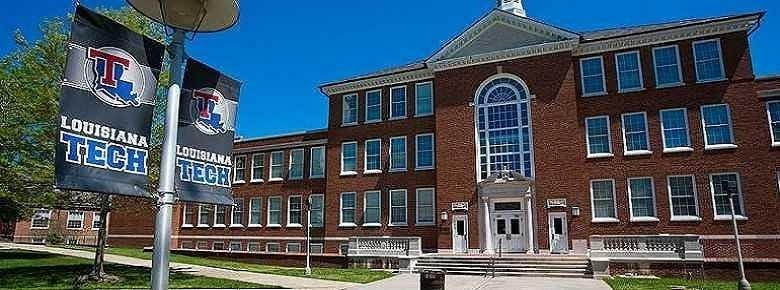
Louisiana Tech University offers a Master of Arts in History. The program specializes in United States history, though courses cover a wide range of regions and periods. The curriculum consists of 33 credits and can be completed online or via hybrid classes. Students can culminate their studies with either a traditional thesis or non-thesis research papers.
Louisiana Tech University is accredited by the Southern Association of Colleges and Schools Commission on Colleges.

Missouri State University offers a Master of Arts in History that offers specializations in US and world history. All classes can be completed through the program’s convenient, 100% online learning format. Graduates often pursue careers in teaching, public history, educational leadership, journalism, administration, or government.
Missouri State University is accredited by the Higher Learning Commission.

Norwich University offers a Master of Arts in History. Specializations are available in Public History, American History, World History, and Legal and Constitutional History. Common courses include Archival Studies, Directed Readings in History, and the Late Agrarian Era. On average, the degree requirements can be completed in 18 months of full-time study.
Norwich University is accredited by the New England Commission of Higher Education.

Pittsburg State University offers a fully online program for a Master of Arts in History. The curriculum is designed to help history educators develop deeper content knowledge and skills in research, communication, and critical thinking. The program requires the completion of 33 credit hours. Incoming students can select one of three yearly start dates in summer, fall, or spring semesters.
Pittsburg State University is accredited by the Higher Learning Commission of the North Central Association of Colleges and Schools.
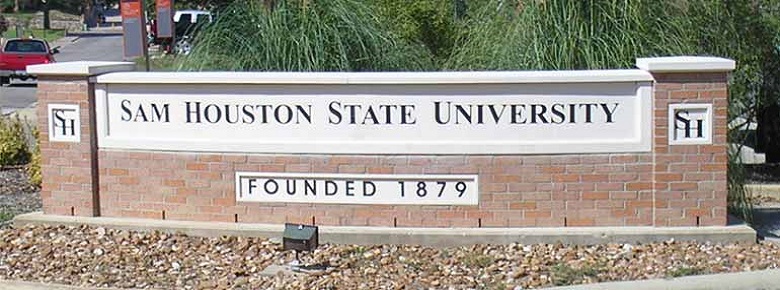
Sam Houston State University offers a Master of Arts in History. The program boasts flexible online classes, around-the-clock learning resources, small class sizes, and expert faculty. After completing the program’s 36 required credits, students can culminate their studies with a thesis or a final project. The program admits new students three times each year.
Sam Houston State University is accredited by the Southern Association of Colleges and Schools Commission on Colleges.

Slippery Rock University offers a Master of Arts in History. Students interested in pursuing careers in law, government, publishing, journalism, consulting, or historical preservation may find an ideal next step in this program. All courses are offered conveniently online. Most students can complete the program’s 30 required credit hours in 2 years.
Slippery Rock University is accredited by the Middle States Commission on Higher Education.
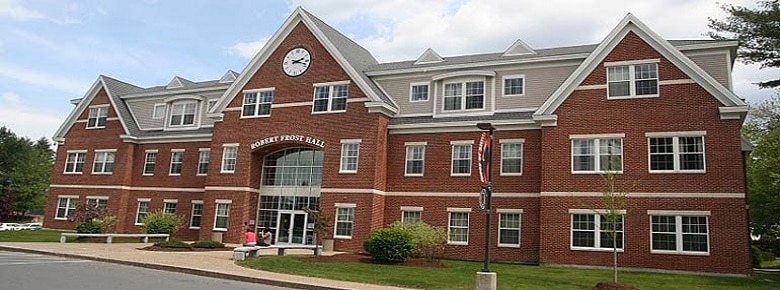
Southern New Hampshire University offers a 100% online program for a Master of Arts in History. The program has concentrations in American, Military, and Public History. The program may be completed at a student’s own pace, but it can typically be finished in 15 months. Students may transfer in up to 12 qualifying credits from outside institutions toward the program’s 33 required credits.
SNHU is accredited by the New England Commission of Higher Education.
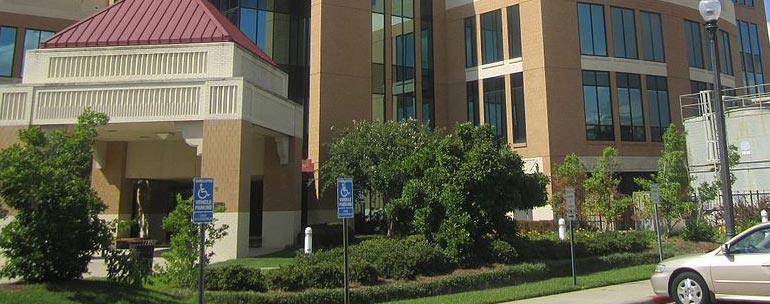
The University of Louisiana—Monroe offers a Master of Arts in History. This program seeks to help students develop broadly applicable knowledge in law, politics, and citizenship. Potential classes include Historiography, Seminar in American Political History, Colonial Latin America, and Renaissance and Reformation. All classes are housed entirely online.
The University of Louisiana – Monroe is accredited by the Southern Association of Colleges and Schools Commission on Colleges.

The University of Massachusetts—Boston offers a fully online program for a Master of Arts in History with specializations in Public History, Archives, and General History. The curriculum consists of 30 credit hours. Classes cover key topics like research methods, archives, information management, historiography, and the history of diverse regions and time periods.
The University of Massachusetts – Boston is accredited by the New England Commission of Higher Education.
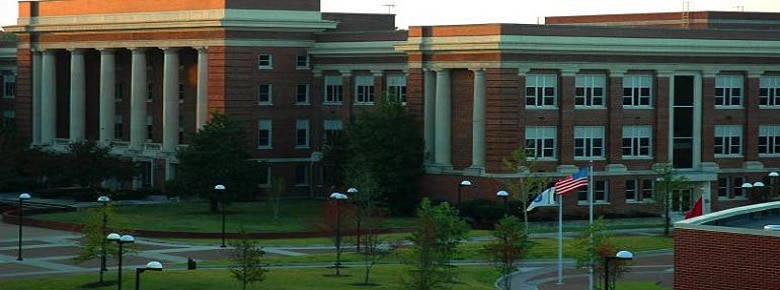
The University of Memphis offers a Master of Arts in History. This program boasts dedicated faculty, convenient online coursework, and a wide array of virtual campus resources. On average, full-time students can complete the program’s 33 required credit hours in 2 years. Potential classes include Topics in United States History, Modern Middle East, and African Women’s History.
The University of Memphis is accredited by the Southern Association of Colleges and Schools Commission on Colleges.
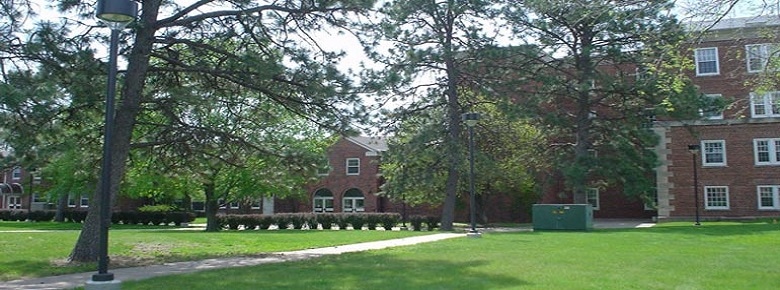
The University of Nebraska—Kearney offers a Master of Arts in History. This program is intended for students who have previously completed a bachelor’s degree with at least 18 credits of history coursework. Classes may be attended fully online or in person. Graduates often pursue careers as public historians, museum curators, college instructors, or historical preservationists.
The University of Nebraska – Kearney is accredited by the Higher Learning Commission.

The University of North Alabama offers a Master of Arts in History. Potential classes include Seminar in US History, Historiography and Methodology, and World History Since 1815. The program requires the completion of 36 credits and meets on campus or online. Full-time students can typically complete the degree in 18 months, while part-time students can often finish in 24 months.
The University of North Alabama is accredited by the Southern Association of Colleges and Schools Commission on Colleges.

Western Kentucky University offers a Master of Arts in History. Graduates of the program often become postsecondary teachers, curators, archivists, or museum technicians. The program admits new students two times a year. A minimum of 36 credits and a thesis must be completed to graduate.
Western Kentucky University is accredited by the Southern Association of Colleges and Schools Commission on Colleges.
Getting Your Master Degree in History Online

If you love learning about history, a history master’s degree program will let you study this field more in-depth. Online history degree programs may help you obtain a masters with more flexibility in your schedule. This could be especially helpful if you’re already a working professional.
With history graduate programs, you can often focus on a concentration you’re passionate about—such as museum studies, world history, military history, or American history. In addition to taking history-related coursework, you can also develop advanced research, writing, and critical thinking skills.
To get started on your journey toward a masters in history, you can begin exploring available program options from accredited universities.

